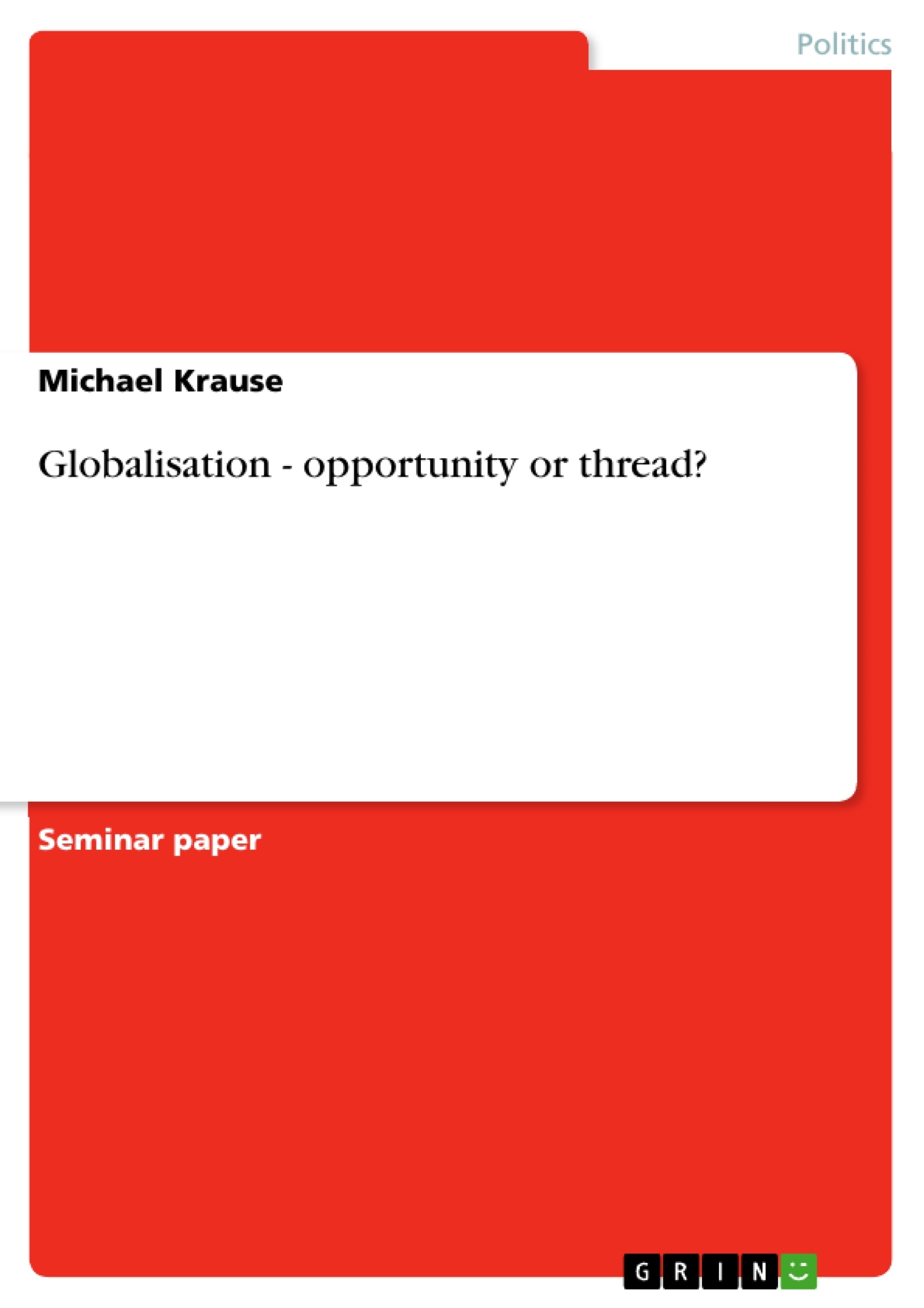Excerpt
Table Of Contents
1 Introduction
2 Definition: What is globalization?
3 History
4 Reasons
4.1 Economic globalization
4.1.1 Flow of money, goods and services
4.1.2 Communication
4.1.3 Transportation
5 Political globalization
6 Cultural globalization
7 Environmental concerns
7.1 Usage of resources
7.1.1 Absolute use
7.1.2 Relative use
7.2 Environmental impact
8 Some are going the opposite direction
8.1 Governmental constraints
8.2 Constraints by companies
9 Pros and cons
9.1 Pros
9.2 Cons
10 Globalization in question
11 Impact on lesser developed countries
11.1 Impact on development countries
11.2 Impact on emerging markets
11.3 Summary
1 Introduction
Stocks are traded worldwide, mails are sent from Australia to Europe and forwarded to the US, the head of the catholic church, Pope Benedict XVI visits Turkey and has a meeting with the head of the Turkish government.[1]
Our world has become a so-called “global village” where everyone can interact with everyone else within seconds or even realtime.
Links between countries, companies and even individuals are no longer limited to borders, religion or attitudes.
The following essay, written by Michael Krause, Erasmus student at the Dublin Institute of Technology, describes how globalization is affecting nowadays life in different fields of society and shows the positive as well as negative influence this global transformation has on lesser developed nations.
2 Definition: What is globalization?
The term “globalization” describes the growing international network in many different fields of today’s life such as economy, politics, culture, environment, communication etc.
It was first mentioned in the article “The globalization of markets”[2], published in the Harvard Business Review, written by Theodore Levitt (1925-2006) who, back in 1983, was an professor at the Harvard Business School:
“[…] Technology, by proletarianizing communication, transport, and travel drives the world toward a converging commonality. Well-managed companies have moved from emphasis on customizing items to offering globally standardized products that are advanced, functional, reliable, and low priced. They benefit from enormous economies of scale in production, distribution, marketing, and management.”[3]
3 History
Although many people think that globalization is a phenomenon of the 20th century, its history has old ancestors. Right from the beginning of mankind, when the first tribes moved to another place hoping to find better conditions for hunting, the world has grown increasingly integrated.
“One of Britain’s most famous imperial spokesmen, Cecil Rhodes, put the case for the colonialism succintly in the 1890s. “We must find new lands,” he said, “from which we can easily obtain raw materials and at the same time exploit the cheap slave labour that is available from the natives colonies.””[4]
Therefore it’s difficult or maybe even impossible to state an exact date when globalization, either in a positive or negative way, occurred for the first time.
4 Reasons
There are several fields where globalization takes place and which can be seen as the main reasons for this worldwide network.
4.1 Economic globalization
One of them is the globalization in the economy whereas flow of money, goods and services is part of it.
4.1.1 Flow of money, goods and services
Especially for companies in industrialised countries the export has become essential. The demand in their domestic market just isn’t enough to boost their sales figures any further. That’s why they have to search for new markets where customers have enough buying power. That could be other industrialised countries as well as some emerging markets.
On the other hand, emerging markets offer low wages together with highly qualified workforce. Therefore many companies source out their production or services which can lead to wealth and employment in the low wage countries.
Compared to that, countries in the so-called “Third World” have huge problems with the ongoing process of worldwide integreation. They can’t keep up with the pace their structure is changing, face problems in infrastructure and some of them have already gotten dependant on the more developed countries.
This problem will be discussed more precisly at the end of this essay.
4.1.2 Communication
As mentioned above, people can write e-mails and tell their friends at the other side of the world what they think or they can even chat in realtime, sometimes without having to pay for it which makes it even more interesting.
Business to business platforms which link companies from different countries become more and more important. And also channels for business to consumer trading are available.
Most of these services have become available through the internet which connects billions of people and has been an important development in recent years.
But revolutionary developments like the ability to print books and newspapers, get information via radio or watch news on television, have had comparable influences on people’s life.
4.1.3 Transportation
Besides this so-called communication revolution, a change in different kinds of transportation has taken place and allows goods to be sent all over the planet. Nowadays the amount of goods shipped via trains, ships or lorries is steadily growing. The quantity carried via planes is about 100 times higher than it was back in 1950.[5]
A letter, sent from Ireland to Germany, only takes 2 days to arrive.
In addition to that, people can easily travel through the whole world and go on holiday wherever they want to.
[...]
[1] Available: http://www.foxnews.com/story/0,2933,232058,00.html, 29/11/2006
[2] LEVITT, T (1983), The globalization of markets. Harvard Business Review, 20. Edition, Nr. 5, p. 92
[3] Available: http://harvardbusinessonline.hbsp.harvard.edu/b01/en/common/item_detail.jhtml?id=83308, 29/11/2006
[4] ELLWOOD, W (2001), The No Nonsense Guide to Globalization, Verso Books, p.13, Oxford
[5] Available: http://de.wikipedia.org/wiki/Globalisierung, 30/11/2006
- Quote paper
- Michael Krause (Author), 2006, Globalisation - opportunity or thread?, Munich, GRIN Verlag, https://www.grin.com/document/67420
Publish now - it's free






















Comments